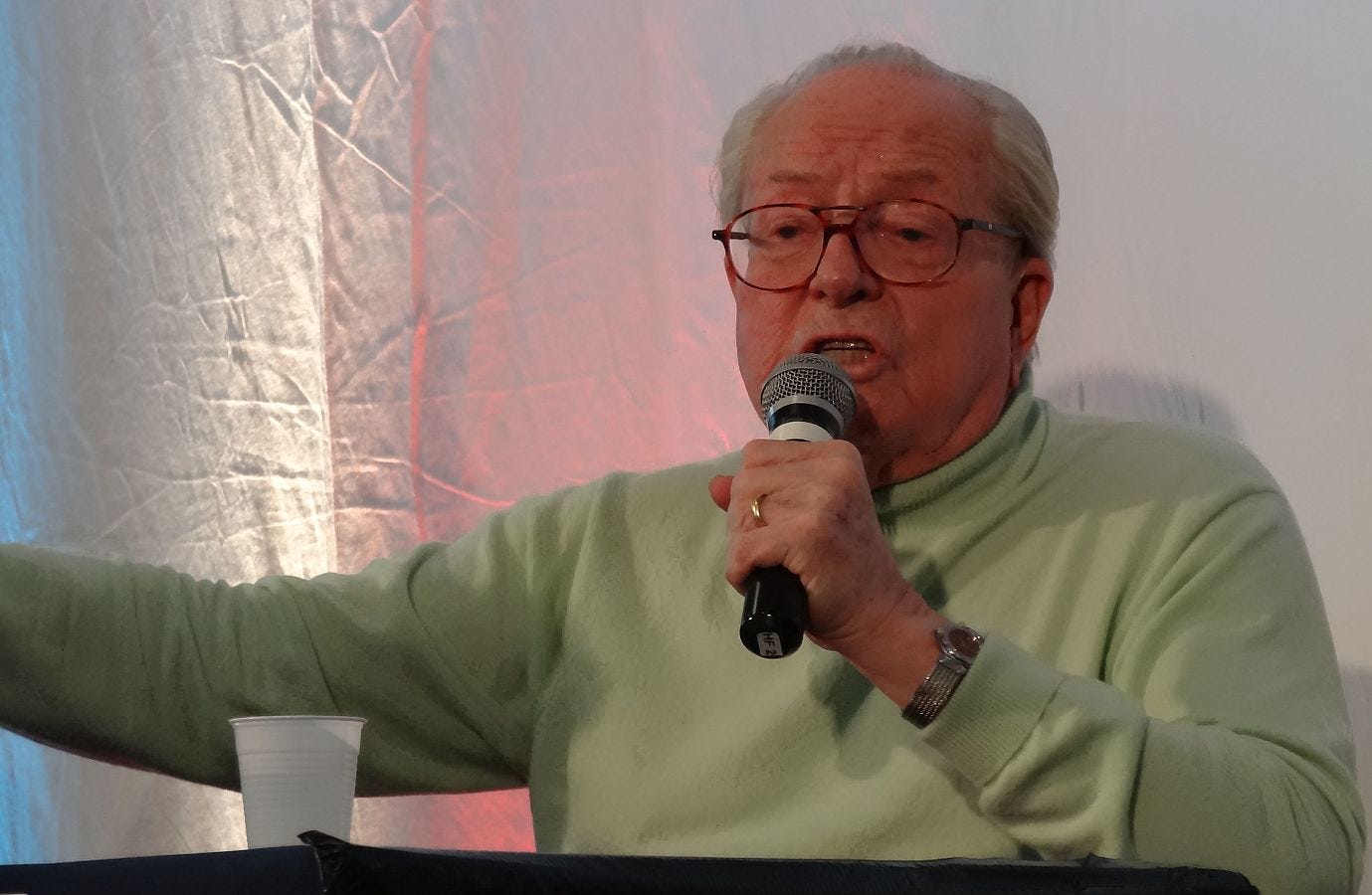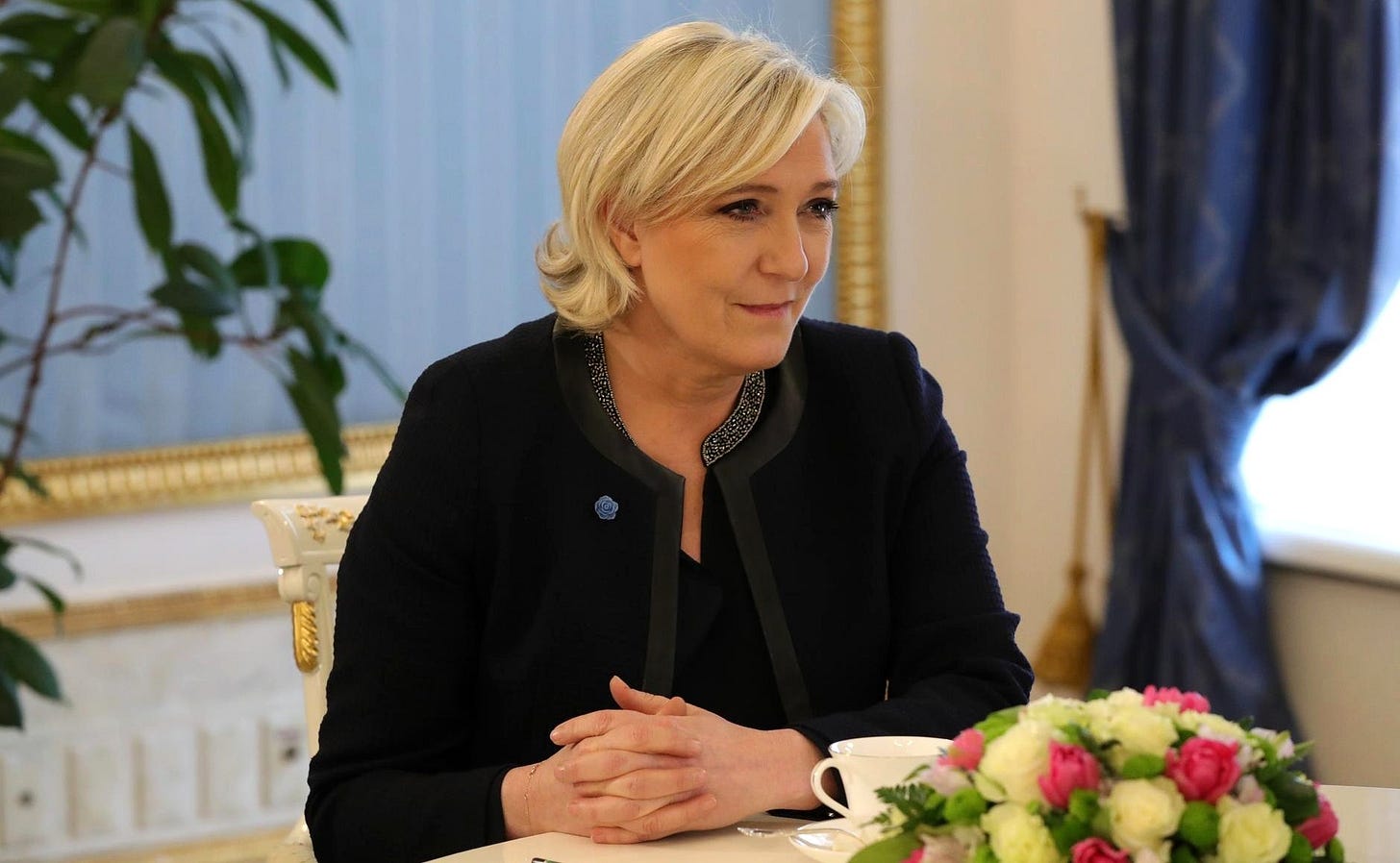Marine Le Pen, the unofficial leader of the French far-right National Rally (RN), was convicted on 31 March 2025 for embezzling European Union funds by misusing parliamentary assistant contracts between 2004 and 2016. She received a four-year prison sentence (two years suspended), a €100,000 fine, and a five-year ban from holding public office, rendering her ineligible for the 2027 presidential election.
Although she has lodged an appeal, it is doubtful that it will succeed, meaning she will still unlikely be able to run.
Marine Le Pen’s conviction was widely criticised by her far-right counterparts, including Viktor Orbán’s regime in Hungary, the Italian Lega’s leader Matteo Salvini, Dutch politician Geert Wilders, and the MAGA regime in the US. Their allies in Russia also criticised the conviction; Kremlin spokesman Dmitry Peskov bizarrely accused France of “violating democratic standards”, as if such standards existed in authoritarian Russia.
The initial charges against Marine Le Pen can hardly be seen as political; moreover, they were not surprising. Both Marine and her father, Jean-Marie Le Pen, have faced accusations of misusing European Parliament funds since at least 2019. Thus, the recent developments are simply a continuation of an ongoing issue.
Another reason why the developments around Marine Le Pen are not surprising is that the Le Pen family has frequently faced accusations of shady activities even before 2019. For example, Jean-Marie Le Pen, the now-deceased founder of the National Front (FN), which was renamed the RN in 2018, was implicated in the Panama Papers for allegedly hiding up to €2.2 million—including cash, securities, and gold—via an offshore company registered under his former butler’s name, to evade French taxes since 2015. Furthermore, details of Jean-Marie Le Pen’s role in helping Saddam Hussein's regime circumvent international sanctions in the 1990s and early 2000s remain unclear.
Naturally, the judge’s decision to bar Marine Le Pen from the 2027 presidential election carries significant political implications for the Le Pen family, as the French presidency has long been their cross-generational aim. Although Marine could theoretically run in 2032, it is doubtful that the Le Pen family's personal political influence will endure her absence. While Marion Maréchal, Marine’s niece, retains some influence within the RN, the French far right may seek to move beyond the family legacy.
Throughout its history, starting in 1972, the FN/RN has undergone a number of transformations. The first occurred in the 1980s when President François Mitterrand strategically elevated the then-marginal FN to weaken the centre-right opposition, turning the FN into a nationwide phenomenon.
The second major transformation came with Marine Le Pen's rise within the FN during the 2010s. This led initially to conflicts with her father—she aimed to steer the party towards a less radical position—and eventually resulted in Jean-Marie's expulsion from the party he founded. Jean-Marie later expressed shame over his daughter bearing his family name, suggesting she marry and change her surname.
While Marine’s consolidation of power within the FN/RN moderated the party somewhat and led to acceptance by the far-right wing of the French centre-right Republicans, she failed to transform the RN into a respectable political force capable of governing in coalition. Parties such as Giorgia Meloni’s Brothers of Italy and Jimmie Åkesson’s Sweden Democrats—far-right entities accepted within mainstream European politics—remain examples seemingly out of Marine Le Pen's reach.
If Marine is indeed prevented from participating in the 2027 elections, her role as the primary far-right contender may pass to a younger RN representative, potentially initiating a third significant transformation. The RN might attempt to occupy the moderate right-wing political space traditionally dominated by the Republicans, who have dramatically lost support over the past decade.
For such a transformation, the RN will require leadership willing to challenge Marine Le Pen's substantial influence within the party—mirroring how she herself previously challenged her father's authority. One potential candidate is Jordan Bardella (born in 1995), the current president of the RN. However, being part of the younger generation alone is insufficient: Bardella still needs to demonstrate readiness for significant political responsibilities. His perceived mishandling of the early parliamentary elections in summer 2024 indicates an urgent need to mature as a political organiser—a development potentially hindered by his loyalty to Marine Le Pen.
The first test for Bardella and his generation within the RN will be the behaviour of RN MPs in the National Assembly. The current government, led by François Bayrou, faces constant opposition from far-left forces aligned with Jean-Luc Mélenchon and relies on support from Emmanuel Macron’s centrist allies, the centre-left Socialists, and the RN. If Bardella withdraws support from Bayrou’s government, it would signal his unreadiness to transform the RN. Conversely, continued support would suggest an intention to position the RN as a responsible political force.





